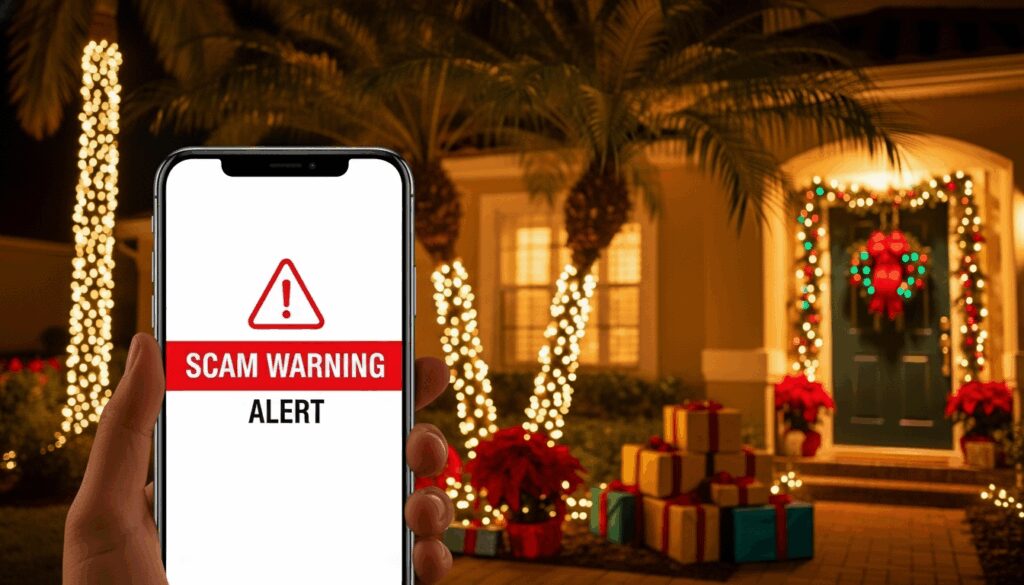2025 Holiday Scams in Florida: Top 10 to Watch and How to Stay Safe
The 2025 holiday season is a time for celebration, travel, and connection — but also a peak season for scammers. Every year, cybercriminals take advantage of the chaos and generosity that come with the holidays. According to the FBI, reports of non-delivery, phishing, and gift card scams surge between November and January, and Florida ranks among the most targeted states due to its mix of retirees, tourists, and heavy e-commerce traffic.
Whether you’re booking a winter getaway, shopping online, or donating to charity, knowing the red flags can save you from heartbreak — and financial loss. Below are the top scams predicted for 2025, insights from cybersecurity experts, and practical ways Florida residents can stay safe.
Why Holiday Scams Spike in Florida
Florida’s holiday environment creates a perfect storm for fraudsters. The state’s vibrant tourism industry, influx of seasonal residents, and culture of online convenience all contribute to higher risk. Data from Travel and Tour World shows that Florida joins South Carolina and Arizona as one of the top five states most affected by Christmas travel scams in 2025. Meanwhile, the FBI warns that cybercriminals adapt their tactics each year — blending old tricks with new technologies like AI-generated phishing messages.
- More online shopping and home deliveries create extra opportunities for “fake shipping notice” or “missed delivery” texts.
- Many residents travel or rent properties, exposing them to fake booking or travel confirmation scams.
- The rush to grab deals and make donations lowers consumer vigilance — a fact scammers count on.
Top Holiday Scams to Watch for in 2025
1. Gift Card Payment Scams
Gift card scams remain one of the most frequent types of holiday fraud. Scammers pose as a boss, a family member, or even a charity asking you to “quickly buy gift cards” and text them the codes. Once those numbers are shared, the money is gone instantly. First Florida Credit Union reminds consumers that no legitimate organization will ever demand payment in gift cards. If you’re pressured to act urgently, it’s a scam.
2. Phishing and “Smishing” Scams
Phishing emails and SMS (“smishing”) messages mimic legitimate shipping alerts, e-commerce confirmations, or charity campaigns. In 2025, many are enhanced with AI, making them appear more authentic than ever. They may include your real name or reference actual retailers. Clicking links can lead to credential theft or malware installation. The FBI advises consumers to never click on unsolicited links — instead, type the company’s official URL into your browser manually.
3. Travel and Vacation Rental Scams
Florida’s sunny beaches make it a hotspot for fake vacation listings and bogus airline deals. Scammers post fraudulent Airbnb or VRBO properties, steal images from real listings, and demand deposits through apps like Zelle or Venmo. Norton’s 2025 scam list highlights fake travel portals as a growing concern. Always verify the URL, read reviews from verified guests, and avoid third-party booking sites that require wire transfers or cryptocurrency.
4. Delivery and Shipping Scams
Scammers send texts pretending to be from UPS, FedEx, or USPS, claiming your package is delayed or needs payment for redelivery. These messages often include links that capture personal information. Legitimate carriers will never request payment via text message. If in doubt, track packages only through the carrier’s official website or app.
5. Fake Charities and Holiday Donation Scams
The holidays inspire generosity — and scammers exploit it. Fraudsters use fake charities or crowdfunding pages that tug at heartstrings. Verify all charities through CharityNavigator.org or the IRS tax-exempt organization search. Be cautious of GoFundMe or social media appeals without a clear connection to a real cause.
6. “Secret Santa” and Online Giveaway Scams
Social media “Secret Santa” exchanges promising you’ll receive gifts from strangers are back — and they’re still illegal pyramid schemes. Similar fake contests or “holiday giveaways” ask for small entry fees or personal info. Legitimate promotions will never require payment or sensitive details to enter.
7. Public Wi-Fi and Device Security Risks
Shopping from airports, cafés, or hotel lobbies can expose you to data theft. Hackers monitor unsecured public Wi-Fi networks to capture passwords and credit card numbers. Norton advises using a VPN or cellular data when entering any sensitive information. Also ensure your phone and browser are updated before traveling.
8. Fake E-Commerce Stores and Deep-Discount Ads
Social media ads for “limited-time” sales can lead to fraudulent websites that never ship your purchase or steal your card info. Before buying, check that the site uses HTTPS, review return policies, and look for authentic customer reviews. A missing customer service phone number or a recently created domain are red flags.
9. Employment and Side-Gig Scams
During the holidays, scammers also target job seekers with fake remote work or “package reshipping” opportunities. These often involve laundering stolen goods or identity theft. Avoid any position requiring upfront payment for training or materials. Check employers on LinkedIn and the Better Business Bureau before sharing your information.
10. Business Email Compromise (BEC) Scams
Florida businesses aren’t immune. Cybersecurity firm Capstone IT Services warns that scammers pose as executives requesting urgent wire transfers or gift card purchases for “employee bonuses.” Always verify unusual financial requests in person or by phone before sending funds.
How to Protect Yourself from Holiday Scams
- Pause before you act. Scammers rely on urgency. Take a breath, verify through an official channel, and never rush into payment or clicking links.
- Use credit cards, not debit or wire transfers. Credit cards provide stronger fraud protection and dispute rights.
- Secure your network. Avoid shopping on public Wi-Fi and install trusted antivirus software on all devices.
- Check URLs carefully. Misspellings or unusual extensions (like .shop or .info) often indicate a fake website.
- Enable transaction alerts. Your bank’s real-time alerts can notify you immediately if suspicious charges occur.
- Monitor seniors and teens. Scammers target both groups through “grandparent” calls or social media offers.
- Report suspicious activity fast. Contact your bank, credit card provider, or the FBI Internet Crime Complaint Center (IC3) right away.
Florida-Specific Holiday Safety Tips
In Florida, additional precautions make sense given the state’s heavy travel and online shopping volume:
- Verify vacation rental listings using trusted platforms and check property ownership on county websites.
- Use package lockers or require signatures to avoid porch theft — especially if you’ll be away for the holidays.
- Be alert for scams involving hurricane relief or utility assistance programs — these often resurface during the holiday season.
- Bookmark local resources like the Florida Department of Agriculture and Consumer Services for official complaint channels.
Frequently Asked Questions
- What are the most common holiday scams in 2025?
- Gift card schemes, phishing texts, fake travel listings, delivery scams, charity fraud, and social media “Secret Santa” chains top the list. Public Wi-Fi data theft and business email compromise are also rising.
- Why is Florida a major target for holiday scams?
- Florida’s mix of retirees, travelers, and e-commerce shoppers makes it an ideal environment for criminals. High tourism volume increases the chance of fake vacation and rental scams.
- How can I verify a charity before donating?
- Use official resources such as CharityNavigator.org or the IRS charity database. Avoid giving through links in texts or social posts.
- Are fake delivery texts common in Florida?
- Yes. Delivery scams spike during December. Always track packages directly on the carrier’s official website.
- How can I avoid being tricked by AI-generated phishing emails?
- Look for spelling errors, mismatched sender addresses, or urgent calls to action. When in doubt, contact the company directly — never reply or click embedded links.
- What should I do if I sent money to a scammer?
- Immediately contact your bank or credit card issuer to report the transaction. Then file a report with IC3.gov or your local FBI field office.
- Is it safe to shop on my phone?
- Yes, if you use cellular data or a secure home network. Avoid public Wi-Fi and ensure your phone’s OS and browser are up to date.
- Can small businesses be victims of holiday scams?
- Absolutely. Fraudsters target business owners with fake invoice or payment requests, often posing as vendors or executives.
- How can I protect my elderly relatives?
- Talk openly about common scams, encourage them to verify requests with family before sending money, and help set up account alerts.
- Where can I report scams in Florida?
- In addition to federal reporting, you can file complaints with the Florida Department of Agriculture and Consumer Services or your local police department.
Stay alert, verify before you pay, and share these tips with friends and family. By staying informed, Florida residents can enjoy a safer, scam-free holiday season. For dependable homeowners insurance, contact GreatFlorida Insurance.



